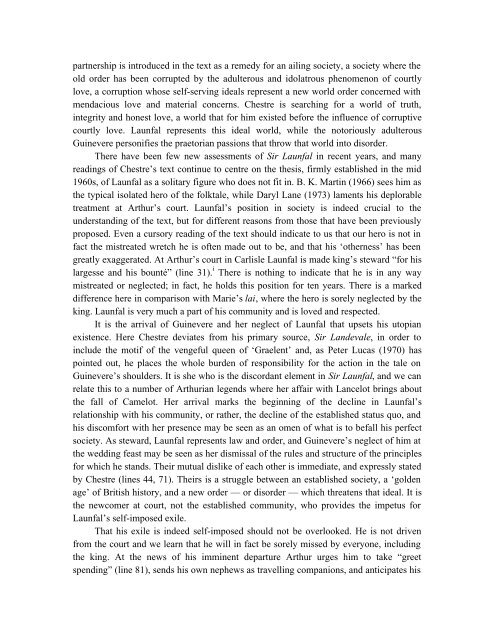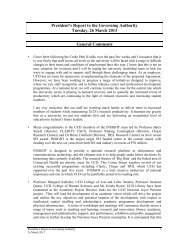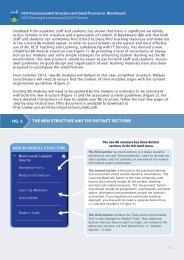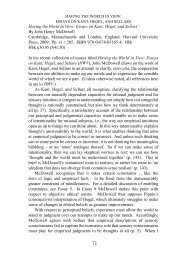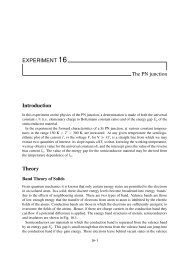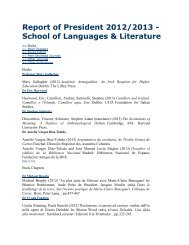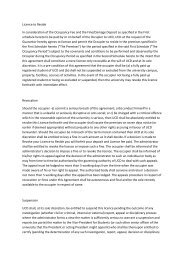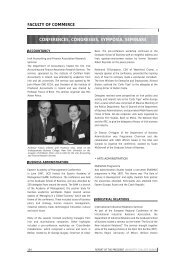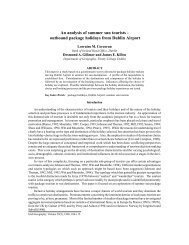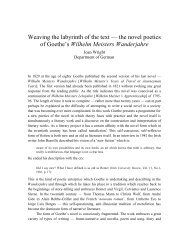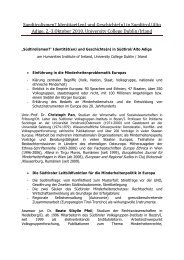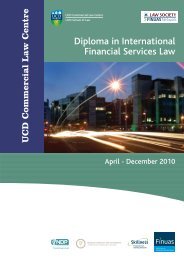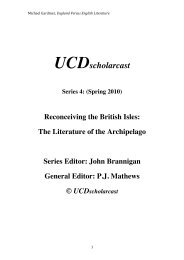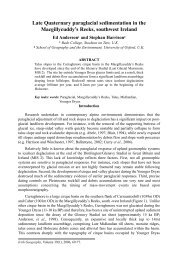Social Disorder and Discontent in Thomas Chestre's Sir Launfal
Social Disorder and Discontent in Thomas Chestre's Sir Launfal
Social Disorder and Discontent in Thomas Chestre's Sir Launfal
You also want an ePaper? Increase the reach of your titles
YUMPU automatically turns print PDFs into web optimized ePapers that Google loves.
partnership is <strong>in</strong>troduced <strong>in</strong> the text as a remedy for an ail<strong>in</strong>g society, a society where the<br />
old order has been corrupted by the adulterous <strong>and</strong> idolatrous phenomenon of courtly<br />
love, a corruption whose self-serv<strong>in</strong>g ideals represent a new world order concerned with<br />
mendacious love <strong>and</strong> material concerns. Chestre is search<strong>in</strong>g for a world of truth,<br />
<strong>in</strong>tegrity <strong>and</strong> honest love, a world that for him existed before the <strong>in</strong>fluence of corruptive<br />
courtly love. <strong>Launfal</strong> represents this ideal world, while the notoriously adulterous<br />
Gu<strong>in</strong>evere personifies the praetorian passions that throw that world <strong>in</strong>to disorder.<br />
There have been few new assessments of <strong>Sir</strong> <strong>Launfal</strong> <strong>in</strong> recent years, <strong>and</strong> many<br />
read<strong>in</strong>gs of Chestre’s text cont<strong>in</strong>ue to centre on the thesis, firmly established <strong>in</strong> the mid<br />
1960s, of <strong>Launfal</strong> as a solitary figure who does not fit <strong>in</strong>. B. K. Mart<strong>in</strong> (1966) sees him as<br />
the typical isolated hero of the folktale, while Daryl Lane (1973) laments his deplorable<br />
treatment at Arthur’s court. <strong>Launfal</strong>’s position <strong>in</strong> society is <strong>in</strong>deed crucial to the<br />
underst<strong>and</strong><strong>in</strong>g of the text, but for different reasons from those that have been previously<br />
proposed. Even a cursory read<strong>in</strong>g of the text should <strong>in</strong>dicate to us that our hero is not <strong>in</strong><br />
fact the mistreated wretch he is often made out to be, <strong>and</strong> that his ‘otherness’ has been<br />
greatly exaggerated. At Arthur’s court <strong>in</strong> Carlisle <strong>Launfal</strong> is made k<strong>in</strong>g’s steward “for his<br />
largesse <strong>and</strong> his bounté” (l<strong>in</strong>e 31). i There is noth<strong>in</strong>g to <strong>in</strong>dicate that he is <strong>in</strong> any way<br />
mistreated or neglected; <strong>in</strong> fact, he holds this position for ten years. There is a marked<br />
difference here <strong>in</strong> comparison with Marie’s lai, where the hero is sorely neglected by the<br />
k<strong>in</strong>g. <strong>Launfal</strong> is very much a part of his community <strong>and</strong> is loved <strong>and</strong> respected.<br />
It is the arrival of Gu<strong>in</strong>evere <strong>and</strong> her neglect of <strong>Launfal</strong> that upsets his utopian<br />
existence. Here Chestre deviates from his primary source, <strong>Sir</strong> L<strong>and</strong>evale, <strong>in</strong> order to<br />
<strong>in</strong>clude the motif of the vengeful queen of ‘Graelent’ <strong>and</strong>, as Peter Lucas (1970) has<br />
po<strong>in</strong>ted out, he places the whole burden of responsibility for the action <strong>in</strong> the tale on<br />
Gu<strong>in</strong>evere’s shoulders. It is she who is the discordant element <strong>in</strong> <strong>Sir</strong> <strong>Launfal</strong>, <strong>and</strong> we can<br />
relate this to a number of Arthurian legends where her affair with Lancelot br<strong>in</strong>gs about<br />
the fall of Camelot. Her arrival marks the beg<strong>in</strong>n<strong>in</strong>g of the decl<strong>in</strong>e <strong>in</strong> <strong>Launfal</strong>’s<br />
relationship with his community, or rather, the decl<strong>in</strong>e of the established status quo, <strong>and</strong><br />
his discomfort with her presence may be seen as an omen of what is to befall his perfect<br />
society. As steward, <strong>Launfal</strong> represents law <strong>and</strong> order, <strong>and</strong> Gu<strong>in</strong>evere’s neglect of him at<br />
the wedd<strong>in</strong>g feast may be seen as her dismissal of the rules <strong>and</strong> structure of the pr<strong>in</strong>ciples<br />
for which he st<strong>and</strong>s. Their mutual dislike of each other is immediate, <strong>and</strong> expressly stated<br />
by Chestre (l<strong>in</strong>es 44, 71). Theirs is a struggle between an established society, a ‘golden<br />
age’ of British history, <strong>and</strong> a new order — or disorder — which threatens that ideal. It is<br />
the newcomer at court, not the established community, who provides the impetus for<br />
<strong>Launfal</strong>’s self-imposed exile.<br />
That his exile is <strong>in</strong>deed self-imposed should not be overlooked. He is not driven<br />
from the court <strong>and</strong> we learn that he will <strong>in</strong> fact be sorely missed by everyone, <strong>in</strong>clud<strong>in</strong>g<br />
the k<strong>in</strong>g. At the news of his imm<strong>in</strong>ent departure Arthur urges him to take “greet<br />
spend<strong>in</strong>g” (l<strong>in</strong>e 81), sends his own nephews as travell<strong>in</strong>g companions, <strong>and</strong> anticipates his


